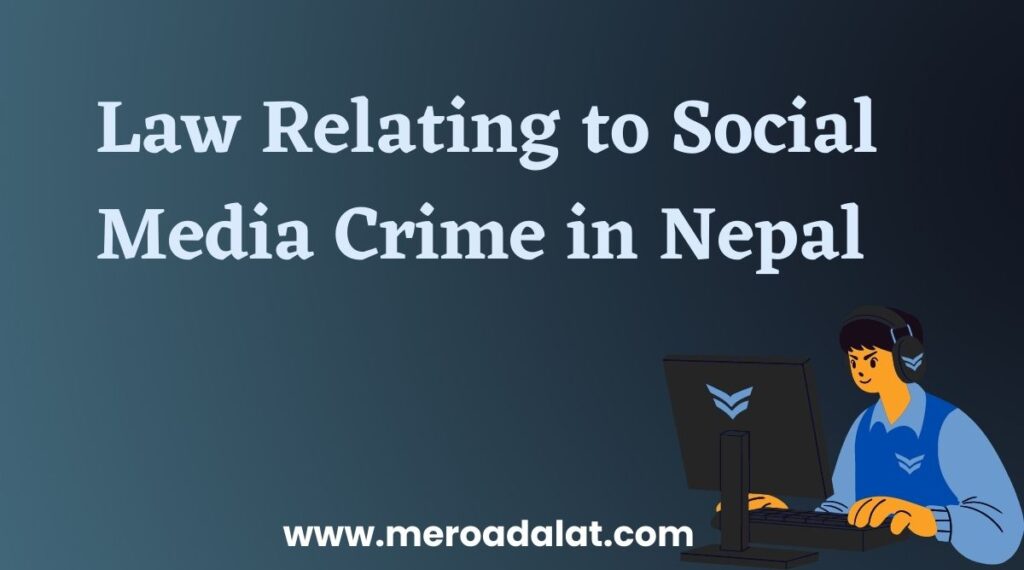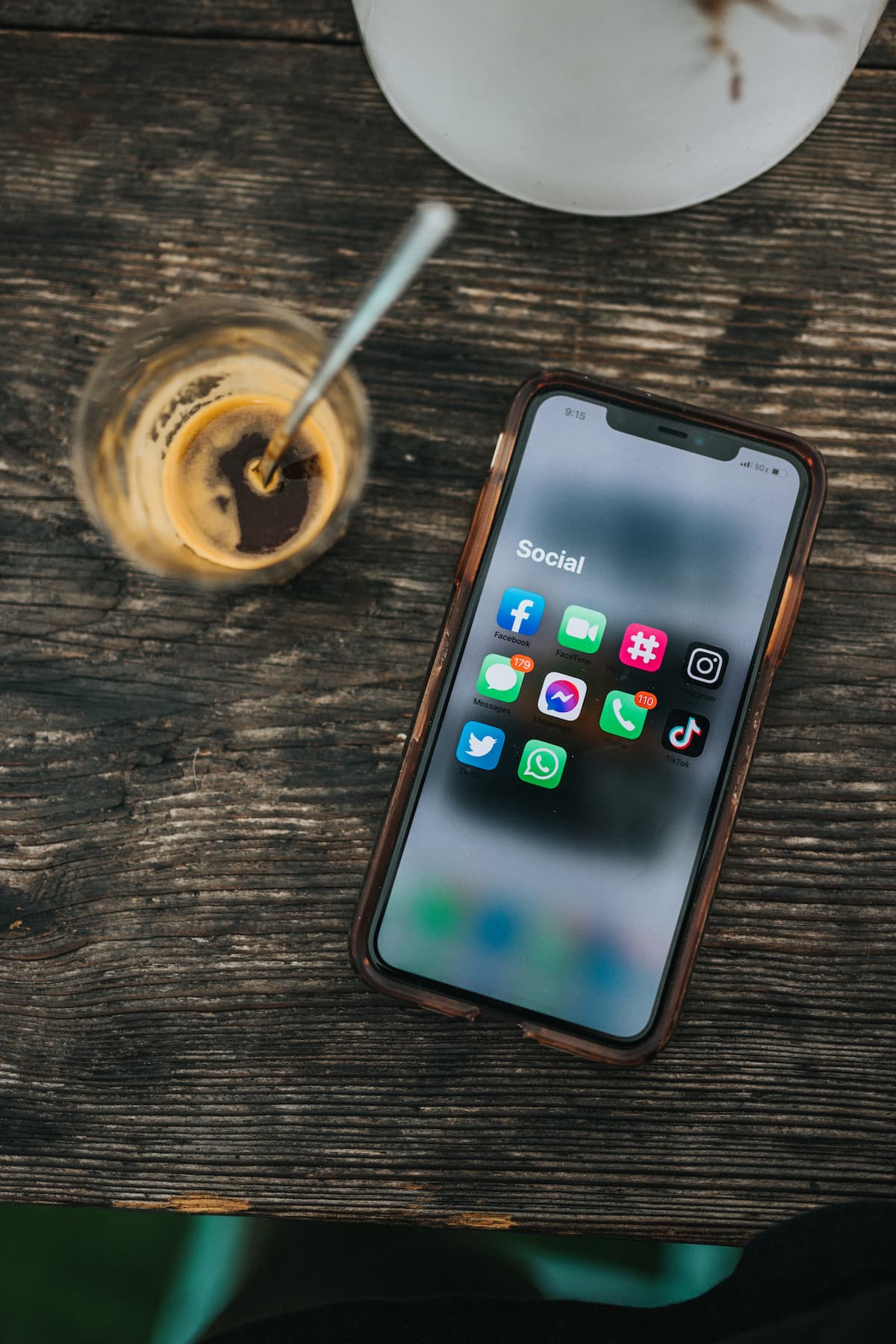This article insights into the social media crime law in Nepal and makes us aware of the possible crimes that can be committed on social media.
Social media means any virtual platform that facilitates the sharing of ideas, thoughts, or information among virtual communities and networks.
The most popular examples of it are Facebook, YouTube, etc. And any acts that are prohibited on social media sites by the laws of the land are considered social media crimes. E.g.; hacking, child pornography, selling illegal items, etc.
In the context of Nepal, there are various laws to regulate laws relating to social media crime in Nepal. The Electronic Transaction Act 2063 is the only IT law in Nepal.
To update it, the new Information Technology bill was purposed in 2075 which is yet to be passed by parliament because of being controversial on freedom of expression. Some social media crime laws in Nepal are illustrated below:
Social Media Crime Law in Nepal
Electronic Transaction Act 2063
Mostly, section 47 of ETA 2063 regulates laws relating to social media crime in Nepal. According to this, it is prohibited to publish or display or make someone publish or display the following materials in electronic media including computers and the Internet;
- Anything which is prohibited to publish or displayed by the prevailing laws
- Anything which is contrary to public morality
- Anything which is contrary to decent behavior
- Anything which may spread hate or jealousy against anyone
- Anything which may jeopardize the harmonious relations subsisting among the people of various castes, tribes, and communities
- Anything that amounts to teasing, harassing, disrespecting, and dishonoring women
And anyone who violates the acts mentioned above would be punishable with a fine not exceeding one hundred thousand rupees or imprisonment not exceeding five years or both.
Furthermore, if any person commits such an offense from time to time then he/she shall be liable to the punishment for each time with one and a half percent of the punishment of the previous punishment.

National Penal Code 2074
Moreover, some of the social media crime law in Nepal are also regulated by part 3 (offense against individual privacy and prestige) of the National Penal Code, 2074. Some of the restrictions imposed by this part of the code are:
Prohibition of listening to or recording other’s conversation
No person shall be allowed to listen to or record the conversation held between two or more people without their consent or permission from a competent authority or else such person shall be liable for a term not exceeding two years or a fine not exceeding twenty thousand rupees or both. (Section 293)
Prohibition on disclosing the confidential matter
No person shall be allowed to disclose confidential matter known to them from their professional work except when compelled by law or else he/she shall be liable to a sentence of imprisonment for a term not exceeding one year or a fine not exceeding ten thousand rupees or both. (Section 294)
Prohibition of taking and disfiguring photographs of any person without their consent
No person shall be allowed to take the photograph of any person without their consent or else he/she shall be liable for a sentence of imprisonment for a term not exceeding one year and or a fine not exceeding ten thousand rupees or both.
Similarly, no person shall be allowed to spoil the appearance of a photograph by mixing some part of one photo with another part of another’s photograph or publishing such photographs, or else such person shall be liable to a sentence of imprisonment for a term not exceeding two years or a fine not exceeding twenty thousand rupees or both. (Section 295)
Prohibition of giving or selling one’s photograph to another without consent
A person shall not give or sell one’s photograph without their consent to another person or publish, publicize, purchase, or sell such photograph, with the intention of annoying, disturbing, or troubling such person or taking any undue benefits or commercial benefits from the use of such photographs.
A person who commits or causes to commit such actions shall be liable for imprisonment not exceeding three years and a fine not exceeding thirty thousand rupees or both. (Section 296)
Prohibition of breaching privacy through electronic means
No person shall be allowed to breach privacy or access any notice or information lying in an electronic form in an unauthorized manner or else such person shall be liable for imprisonment not exceeding two years or a fine not exceeding twenty thousand or both sentences. (Section 298)
Prohibition of committing slander
No person shall use degrading words with the intention of lowering the reputation of another person and anyone who commits such action shall be liable for imprisonment for a term not exceeding one year or a fine not exceeding ten thousand rupees or both sentences. (Section 305)
Prohibition on committing libel
No person shall defame another person. The act of making a false accusation of someone with the intention of harming or damaging the character of another person or a dead person through written words or conduct or signs or by visible representation shall be considered defamation.
And any person who commits such offense shall be liable to a sentence of imprisonment for a term not exceeding two years or a fine not exceeding twenty thousand or both the sentences. (Section 307)
Limitation
No complaint shall lie after the expiry of three months from the date of knowledge of the commission of any of the above offenses.
All restrictions help to decrease social media crime and also help to implement the social media crime law in Nepal more effectively.

Libel and Slander Act, 2016
This act also helps to regulate social media crime law in Nepal. Social media crime law in Nepal is the new concept of law in our society.
This act prohibits the expression of statements that could damage the reputation of a person. It also highlights the circumstances under which an act shall not be considered libel. They are:
- making an allegation of a true matter for the interest of the general public,
- to express any public opinion in good faith about the conduct of any public servant
- to express any public opinion in good faith about the conduct of any person which is concerning to public issue
- to publish a true report of court proceedings
- to express any opinion on the merits or demerits of any civil or criminal case settled by a court or about the conduct of the plaintiff, defendant, witness, or attorney of any such a case
- to express any opinion on merits or demerits of that matter on which one has submitted for the public opinion
- expression by the person who has the right by the virtue of the law to indicate the deficiency in the conduct of another person
- to blame, in good faith, the character of a person for to safeguard one’s or another’s interest or for the interest of the general public
If there is any cause to institute a case against any person on the above offenses, a suit has to be filed within six months after the date of the cause of action.
The Copyright Act 2059
This act also helps to regulate laws relating to social media crime in Nepal. This act protects the creator’s rights over his/her creation. The creation can be artistic, literary, musical, or any other form. It is not compulsory to register to gain copyright over one’s creation.
Only the copyright owner shall have the economic right over his/her work. And the economic right shall be vested in the following persons: (Section 6)
- author
- co-author
- organization at whose direction or initiation such a work has been so prepared
- that person or organization who has paid remuneration for the preparation of the work
- the publisher of the work in case of anonymous work
- the producer, in the case of audio-visual work
Here, the economic right consists of the rights (Section 7)
- To reproduce the work,
- To translate the work,
- To revise or amend the work,
- To make arrangements and other transformations in the work,
- To sell, distribute or rent the original and copy of the work for the general public,
- To transfer or rent the right of audiovisual work, work embodied in sound recording, computer program, or musical work in graphic form conferred to that author or owner,
- To import copies of the work,
- To have a public exhibition of the original or copy of the work,
- To perform the work in public,
- To broadcast the work,
- To communicate the work to the general public
Types of digital content that can be copyrighted are blogs, screen displays, social media posts, short online articles, apps, photos, and website content. Social media sites do not own their posts.
One has the intellectual property right over the content they created and shared on social media. However, while sharing, posting, or uploading the content on social media covered by intellectual property rights you grant them the non-exclusive, transferable, sub-licensable, royalty-free, and worldwide license to host, use, distribute, modify, run, copy, publicly perform or display, translate, and create derivative works of your content.
This means, for example, that if you share a photo on Facebook, you give them permission to store, copy, and share it with others.
But of course, you can choose in your settings and privacy whether to make it public or not.
However, the doctrine of fair use is an exception to copyright. Under the following circumstances, the copyrighted materials can be used without authorization; (Chapter 4)
- to reproduce some portion of a published work for personal use
- the published work can be cited for fair use
- to reproduce, broadcast, and exhibit some portion of the work for the purpose of educational activities
- reproduction by libraries and archives without deriving economic profits
- reproduction, broadcast, and other communication allowed for the purpose of information to the general public by mentioning the source and name of the author of any work
But anyone who carries out the following acts shall be considered to have infringed the rights protected under the copyright act; (Section 25)
- To reproduce copies of a work or sound recording and sell and distribute them or publicly communicate or rent them with commercial or any other motive with or without deriving economic benefits without authorization of the author or the copyright owner,
- To do an advertisement or publicize by copying a work belonging to another person with the motive of taking advantage of the reputation gained by that work,
- To make work of another subject or nature by changing the form and language of a work belonging to another person with a motive of deriving economic benefit,
- To make an attempt to take benefit by adapting any work directly or indirectly with the intention of making the viewer, listener or reader believe it to be another work through advertisement or by any other means,
Any person who infringes above mentioned protected rights of the owner shall be punished with a fine of a sum from ten thousand to one hundred thousand rupees or with imprisonment for a term not exceeding one year or both sentences. (Section 27)
Trademark (Patent, Design and Trademark Act, 2022)
This act also helps to regulate laws relating to social media crime in Nepal. One can apply for a trademark of their username even if you are merely using the username to provide information or entertainment.
You can only take the username not taken by others. One can have the same name on social media site but one cannot have the same username to indicate two different people or organizations. The blue tick on social media sites like Facebook, Twitter, etc. signifies a verified account.
A verified account is an account that has been confirmed as being authentic. These accounts are often used by celebrities, politicians, and brands to show they are who they say they are. It prevents being scammed by fake account users.
Social networking websites have changed the landscape of not only how we interact with one another but also how companies reach consumers. The company relies on social media sites to expand its consumers.
Expanding business through social media not only brings benefits but also the risk of trademark infringement. People may use fake trademarks to sell their products and services online.
The violation of a trademark can be reported on social media. Anyone who copies or uses or causes to use the trademark registered in another person’s name for their own benefit could face punishment with a fine not exceeding one hundred thousand rupees.
For Answers and Questions
Simple infringements can be reported on social media pages itself whereas serious crimes can be reported at nearby police stations.
You can file a complaint of social media crime through mail at [email protected] along with a copy of a valid identity card such as a citizenship certificate or driving license and details of the crime with necessary links.
The most common social media crimes in Nepal are identity theft, privacy leaks, harassment, phishing, scams, defamation, etc.
Social media crime is also a type of cybercrime. Both are committed using computers or the internet however social media crime is committed specifically through social media sites like Facebook, Twitter, YouTube, etc. and cybercrime is committed with or without the use of social media. Social media crime law in Nepal is a recent trend in Nepal.
Conclusion
As we know that laws change with the society, laws relating to social media crime in Nepal are the new type of laws and most essential laws in this advance and upgrading society. Nowadays most people use social media. The crime in social media is increasing just like the number of social media users is increasing. So the laws relating to social media crime in Nepal are the most necessary laws to be brought.

What is the rules in nepal? If my social media account use another person without my permission?
I saw many unnecessary tags in my Facebook I’d
I’d name:Ashim bhurtel
Please do action
You can change your privacy or tag settings.
I think libel and slander act ,2016
Copyright act 2059 is already dismissed